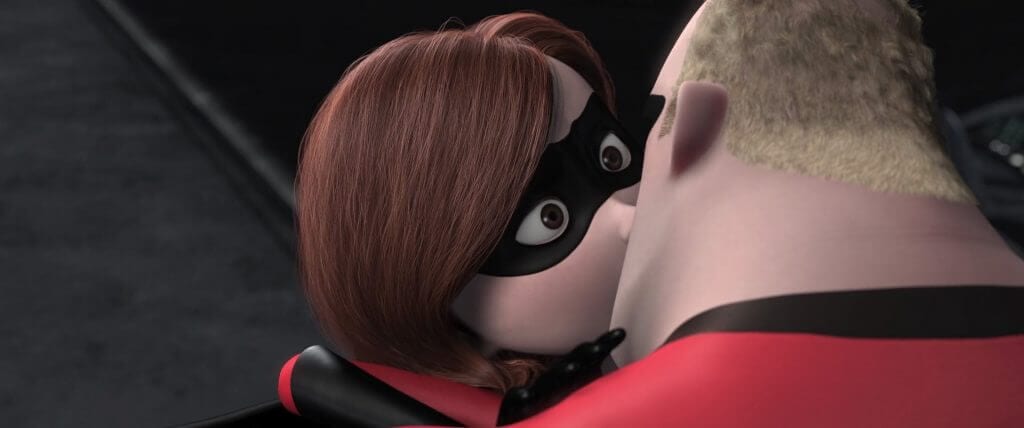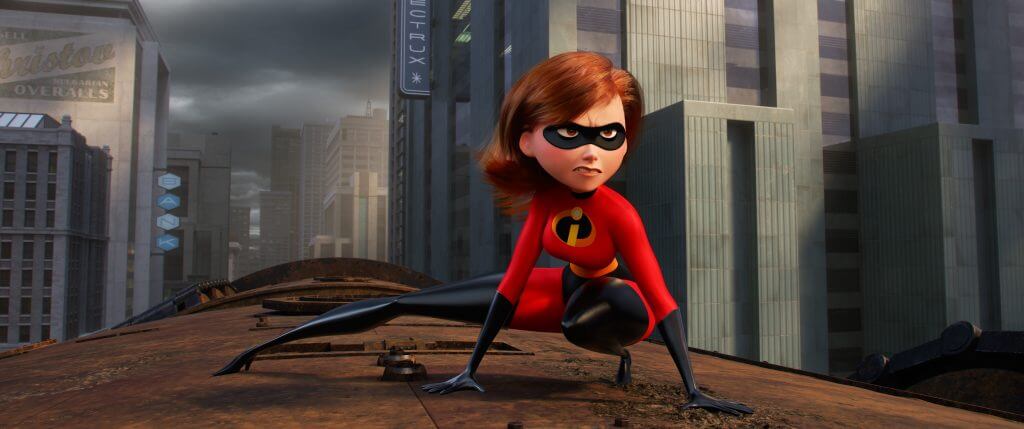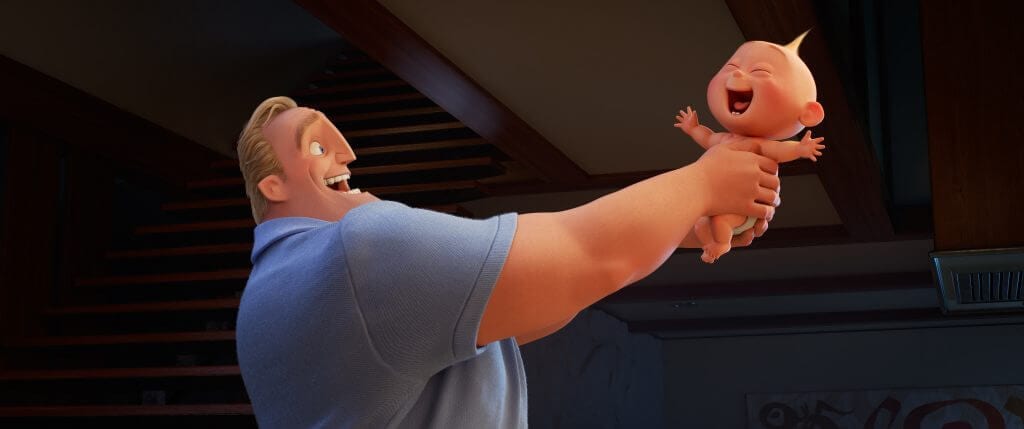The Incredibles vs. Incredibles 2
As I’ve mentioned on a couple of occasions, The Incredibles is my favorite movie ever and I was more than a little excited about the new sequel. I’ve seen Incredibles 2 twice now and have been thinking about it nonstop since Thursday night. As I mentioned in my review, a couple of things did bother me, like the new supers we don’t really get to know. However, I still felt a nagging in the back of my mind that I couldn’t quite put into words. After a second viewing and a lot of thought I have more to say on the subject and I’ll be using the first film as a measuring stick of sorts.
I’ve heard a lot of friends say Incredibles 2 is the superior film, and even people who didn’t like the first one much seem to love the follow-up. I was absolutely mystified by this, as even right after the first showing I didn’t love it quite as much as the first. The technical aspects are amazing; the music is as good as the original and the animation is jaw-dropping. But I have a few issues relating to the story and characters, as well as the themes.
The Incredibles is a film that’s stuck with me for years and has directly impacted my life. When I was a kid I probably couldn’t have told you why I thought it was so good or why I owned all the action figures, but there was something about it that resonated with me and with a lot of other people. I don’t consider it perfect, but one that exemplifies everything I love about film as a medium. The Incredibles is packed to the brim with comedy and heart-racing action, and while that makes it extremely entertaining, it isn’t what I love about it. This is a movie that’s extremely good at creating seemingly trivial setups with satisfying payoffs.
*Spoilers for The Incredibles and Incredibles 2*

In the beginning at their wedding, Helen tells Bob that he’s got to be more than Mr. Incredible. Over the course of the film we learn that, like anyone else, Bob isn’t perfect; he doesn’t know how to be more than his superpowers, and life in the private sector doesn’t exactly come naturally to him. His wife bears the brunt of his bitterness toward the system that forced them into hiding, an unfair conflation further inflamed by her opposition to him sneaking out to do illegal hero work. His children suffer at school because at home they can’t get his attention and Helen is literally stretched in all directions trying to keep up with them and meet their needs.
Although Bob has good intentions and a burning desire to help people, his family suffers due to his neglect and he selfishly jumps at the chance to leave them for a “conference” that is both dangerous and mysterious even to him. In a way it’s frustrating, because the actions and beliefs that get him into these predicaments are fundamentally good: he was forced into hiding for trying to save a train full of people and a suicidal man. He gets fired because he has a core need to help people, something he can’t do working at InsuraCare. And even when the time comes he tries to remain calm and keep his job, but Mr. Huph’s callous nature sends him over the edge. The problem lies in that, once he is fired, Bob elects to deceive his family and risk his own life for the gratification of getting back into vigilantism.
Also, in the Glory Days sequence, Mr. Incredible rejects Buddy, his biggest fan. This is understandable given that Buddy is essentially stalking him, and that he is a child that Mr. Incredible can’t risk endangering. The problem is the way in which he does so, which is absolutely no excuse for Buddy’s behavior, but nonetheless fuels his later hatred for supers. Buddy is a little like Gaston from Beauty and the Beast in that at first he just seems like a nuisance who won’t have any lasting effect on the plot. Mr. Incredible’s hubris helps create a monster that nearly takes his life, and his whole family, away from him. This serves as a great payoff and one of the most truly surprising villain reveals when we discover that Buddy and Bob’s new employer are one and the same. Even still, it’s never a question of who is right; Syndrome feels that he was mistreated by his hero, and his natural response is to kill a bunch of people and create dangerous weapons to sell to whoever has the fattest wallet. The point is driven home when Helen and the kids are believed dead at Syndrome’s hands; Bob threatens to crush Mirage if he isn’t released, but ultimately can’t or won’t bring himself to do so. A shaken Mirage finally betrays Syndrome and helps Mr. Incredible and his family, stating that “valuing life is not weakness.”

The Incredibles is incredibly satisfying, and at times cathartic to watch because they set up various problems and ideas and there’s always a gratifying resolution. And every subplot and problem is directly linked to Bob’s personal journey, creating a complex and smartly woven narrative swimming in details and ideas that make each viewing feel like a new experience. Bob isn’t able to humble himself and admit his own faults until he realizes what life would be like without his family. The first time he sees Helen on the island, he pulls her in for an (unwanted but sincere) embrace and kiss. In the scenes directly after the Glory Days prologue he’s cold and distant to her, despite her good humor and encouraging nature. In the Life’s Incredible Again montage, we get a lot of affection between the two, as well as Bob encouraging and playing with the children. But this is not because he has confronted the problems within himself or seen the value in his family; it’s because he’s rejuvenated by being on Nomanisan Island (Get it? Get it?) and his frustrations with them have momentarily subsided. He also no longer has money restrictions due to Syndrome paying him triple his “current annual salary” for his mission. To a child this all reads literally, and they may even be bored at times. But an adult or even a teenager can recognize that they’re replacing the midlife crisis love affair with Bob lying to his wife to do hero work; in fact, that’s exactly what she thinks is going on, as it would explain all of his sudden changes in behavior and mood.
Only when Bob is willing and able to measure up his own flaws can he really see what he’s been doing wrong. He treated the people he loved like strangers — and in some cases like enemies — putting his faith (and his life) in the hands of actual strangers with malicious intent. I read a review once that said The Incredibles is like a 2-hour family therapy session, and I think that’s true. Bob is the protagonist and the focus is on his mistakes and character development, but Helen and Violet learn something too. Helen wants to hold her children back and protect them from what she’s had to deal with: rejection, constant moving and having to re-adjust. This creates more marital strain when Bob’s actions often lead to the family having to move, the kids changing schools, Bob changing jobs and everyone adjusting to a new life. But when she sees what her children can really do, she simply stares, mouth agape. Not only are they capable and talented, but their parents wouldn’t have escaped Nomanisan or defeated the Omnidroid without their help. Violet experiences the most noticeable change after Bob, gaining self-confidence and an appreciation of her own abilities. Dash doesn’t have a character arc, but the wonder on his face when he sees his abilities is pretty great nonetheless.
Incredibles 2 is a thrill ride from start to finish, but it’s not a thoughtful character study with interwoven subplots, full of satisfying payoffs. At the start of the film Bob is still a tad full of himself, which is okay; it’s a little more realistic this way, and people don’t change overnight. He is intensely jealous when Helen is offered the chance to shine, and seems wounded any time it comes up. But his arc in this film has nothing to do with this; it’s all about getting to know his kids and learning to take care of them. This is a wonderful concept executed beautifully, but the film feels unfocused. Why repeatedly indicate that Bob is jealous and insulted by the Deavors’ choice to use Elastigirl instead of him if it’s not going to be a part of his development? If Incredibles 2 was like The Incredibles, he would apologize to her and look inward to his own insecurity. There isn’t a web of strong running themes in this film like in the original.

The Incredibles works so well because all of the ideas and problems directly play into the plot and Bob’s crisis. Incredibles 2 feels like two different movies to me; one about Elastigirl getting her groove back and one about Bob learning to be a dad. They’re both good movies, but together they never really form a cohesive whole. In The Incredibles whenever people are talking or having an argument, there’s something else going on beneath the surface, more than what is initially evident. When the parents argue about whether Dash can go out for sports, they are really debating whether the law is right, and whether they should even have to hide what they are. In Incredibles 2 things mostly just are what they are; Bob and Helen talk on the phone while she’s gone and the conversations are superficial and boring: Helen is excited to be a hero again; Bob is jealous; Bob hides how difficult raising the kids can be.
I also mentioned that some of the adult undertones from the original are scrubbed away here. There’s definitely no evidence of sexuality, but more than that, I never got the feeling that these two loved one another at all. In The Incredibles they behave so much like a real couple, with real problems but real love. When they are together in Incredibles 2 it’s a mixture of antagonism and frigidity. There’s one kiss in the film and it’s done by Helen, under the Screenslaver’s control, to trick Bob and get him under mind control as well. In all fairness, there are tender moments between Bob and his children, the best of which being when he humbles himself to Violet and apologizes. He says he just wants to be a good dad and doesn’t know what the right thing is anymore. This scene feels like something that would have been in The Incredibles, a cathartic payoff to the trouble he’s been having taking care of the kids. His relationship with and challenges surrounding the kids are wonderful, a lovely companion piece to the commentary on marriage in the first film. But in The Incredibles there were moments with the children, such as Bob racing cars with Dash and noticing Violet’s new hairstyle. In Incredibles 2, with the focus on the children, the parents don’t get similar little reminders that they are also an integral part of the family, a team working together to fight evil and raise their kids.
In The Incredibles, every character is essential to the plot. Frozone is not only Bob’s best friend, but also his moonlighting buddy. Gazerbeam is only mentioned in name, but ends up being integral to discovering what’s really going on and defeating Syndrome. Aside from creating their suits, Edna informs Helen officially that Bob has been sneaking around and helps her find his location. Mirage lures Bob and the other supers to Nomanisan in the first place, and just as importantly helps the family escape and catch up to Syndrome. In Incredibles 2 Edna and Frozone have great scenes, but they don’t intertwine with what Helen is doing. It feels like they were written in because of their immense popularity in The Incredibles. And the new supers, such as Voyd and Krushauer, are beyond pointless. They show Elastigirl that she has inspired supers everywhere and… that’s it. Seriously? These guys have such great designs and superpowers! Why can’t we learn more about their personalities? Why can’t they have more of an impact before the final battle? Lame.

I maintain that Incredibles 2 is a satisfactory follow-up to The Incredibles. I love the interactions between Bob and his kids, the visuals and music exceeded my expectations and they do introduce a lot of great ideas. I want to love Evelyn, and when she reveals the truth to Elastigirl I wanted to feel something — anger, sadness, surprise — anything. But much like the new supers, I feel like we didn’t see her enough to care or be surprised by anything she does or says. The conversation between the two about living in the shadow of a man sounds like something out of the first film, but there’s no response, no payoff. The reveal doesn’t feel like a payoff, just an inevitability at this point.
I think it’s a testament to both films that people can even debate which is better. But The Incredibles fundamentally changed the way I look at film, creating unforgettable characters, deconstructing and developing them, and exploring complex questions and themes. In short, Incredibles 2 is no Cars 2, but it’s not Toy Story 2 either. It’s a satisfying follow-up to The Incredibles, but it’s not as good and certainly not better.







